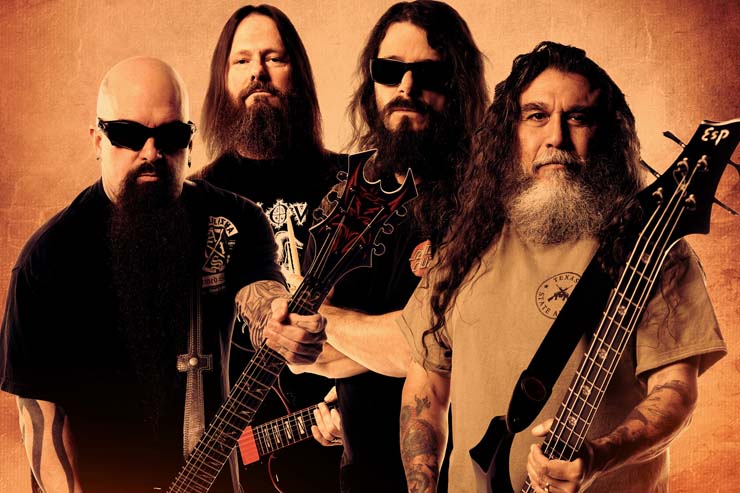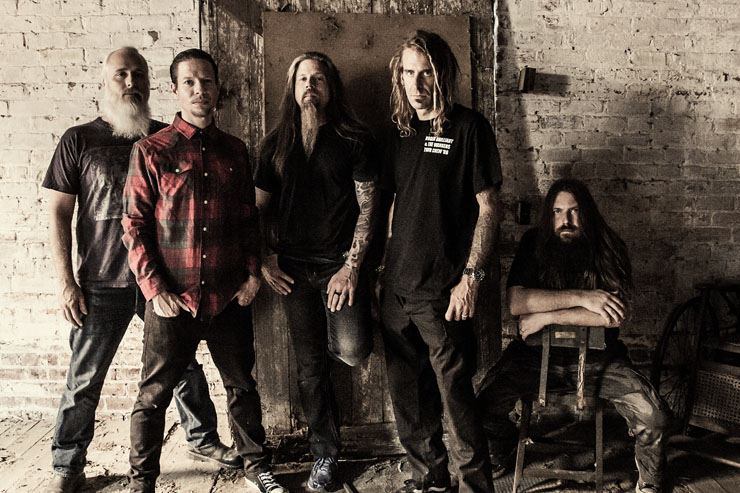Logjam Presents & 96.3 The Blaze welcome the long-reigning titans of thrash, Slayer with special guests Lamb of God and Behemoth live in concert at the new KettleHouse Amphitheater on August 17, 2017 for the 2nd Annual Blaze Backyard BBQ!
Tickets available at The Top Hat, online, or by phone at 877-987-6487. General Admission standing pit tickets, reserved stadium seating tickets and general admission lawn tickets will be available while supplies last. A limited number of VIP Packages are also available. VIP details here.
Slayer
Slayer, the long-reigning titans of thrash, returns with Repentless, the band’s 11th studio album and its first album for Nuclear Blast. Produced by Terry Date, Repentless was written and recorded by guitarist Kerry King and singer/bassist Tom Araya at Henson Studios in Los Angeles, along with returning drummer Paul Bostaph and guitarist Gary Holt. Repentless is crushing and brutal, steadfastly refusing to cater to the mainstream.
Thirty-four years into its career, Slayer remains the preeminent punk-thrash band that helped establish the genre and that up-and-coming metal heads continue to revere and emulate. Slayer is a five-time nominated, two-time Grammy Award-winning metal juggernaut that writes songs which mirror the turmoil and aberrations of our society. Repentless, the band’s first new album in six years, continues the Slaytanic offensive with a twelve-song, blood-shaking sonic attack. Repentless is dark, fast, aggressive and without mercy. It was also the most challenging record Slayer has ever had to make.
In 2013 the world mourned the loss of guitarist Jeff Hanneman who died from complications following a two-year illness. A co-founder of Slayer, losing Jeff was very difficult for the band. During Jeff’s illness, friend of the band, guitarist Holt stepped in to help out on tour with Jeff’s blessing and stayed on. Around that time, drummer Dave Lombardo exited the band for the third time and Paul Bostaph, (who played with the band from 1992 – 2001), returned to take over the throne. Slayer never skipped a beat and since Holt and Bostaph both played in Exodus, it was all-in-the-thrash-family.
But it didn’t come easily. As guitarist and Slayer co-founder Kerry King puts it, “I remember the day that Jeff died. It was the day of the Revolver Golden Gods Awards. We knew he’d been sick but nobody expected it to be so quick. I assumed I’d be able to go out there and see him after I got done with whatever business I had to do and that day never came.
“We went out and toured afterwards to see how we felt about it. That’s what you do as a musician: you either go out and tour or you stop working. Even though we’d been touring for two years without Jeff, thinking he was going to come back, now there was finality to it. And the thing with Gary was that we were all friends. Exodus was the first band we’d ever met that became our friends immediately and we stayed friends throughout the years. Gary is just a guitar dynamo and he was the guy.”
Tom Araya agrees. “Jeff would want us to continue. I’d think that if something were to happen to someone else in the band, whoever it was would feel the same way. Just get on with it. Gary’s a friend, a friend of Jeff’s, he knew what was going on and he wanted to help in any way he could, so Gary made Slayer a comfortable place to be. Having Paul back was also a comforting feeling. He’s a former member and that’s the best thing about it. It wasn’t some other guy. Having Paul and Gary made everything a little easier to handle. It’s about the band. Slayer was a big thing for Jeff, and so I’m looking at it in that sense. It was his baby, too. And we hope we’ve done Slayer and him justice.”
King said that Slayer still had to test the water. “Now we were out to see if it made sense to continue, to see if we liked it, to see if the band still enjoyed it. And the way I looked at it was: if it wasn’t this, it was going to be something that sounded exactly like this, so why not continue doing this? It’s super-potent. We’re really tight right now and we’re stoked that we’re still doing it. Once we had that under our belts we started thinking about a record and never looked back.”
After two decades with American Recordings, Slayer found a new home with Nuclear Blast, the German independent label known for its metal roster. King is enthusiastic about the move, “I like it,” he declares, stressing the work like. “Having been with American for so long we wanted to give them first right of refusal because that’s how we are. I think continuity is far stronger than switching all the time. But at the end of the day, Nuclear Blast made us a great offer and so it was time to move on. At Nuclear Blast, people go to work, they do their job, get paid and they fuckin’ like it. All hands. So it was the right choice.”
When the time came, Slayer entered the studio with producer Terry Date. Date is the first producer the band has worked with since leaving American, where all their albums were produced or executive produced by Rick Rubin. On working with Date, Tom says, “He’d done all these great albums – Soundgarden, Pantera – and as a singer I need someone I respect who can tell me whether he likes it or not as opposed to telling me how to do something I’ve been doing for 30 years. He would guide me. That’s why I really liked working with him, because he was so cool. I regard him as a friend, for sure.”
Kerry adds, “It was as business as usual as it could be. The oddest thing for me was Jeff’s presence… not being there. When we were recording, in the past, whether he played or not, having him there and having his opinion and stuff like that: that was what I missed. Jeff’s not being there was the oddest thing.”
Gary Holt came on board to help out with tour commitments when Jeff first became ill. “My role in Slayer started out as a tour and happened to come when I was taking time off from Exodus and I spoke to Kerry who asked if I could help out. I went down to rehearsal and Jeff showed me some things. I’ve known Jeff forever but it wasn’t until his memorial that I learned how much of his blessing I really had. At the end of the day, we all wanted
Jeff to come back and then tragedy struck; so here we are five years later and Repentless is coming out and I think Jeff would have loved it. I’m super-excited. It’s a good feeling and I know it’s got to be a great feeling for Tom and Kerry for all the work they’ve done – and Paul as well. Everybody’s excited.”
Repentless marks the return of drummer Paul Bostaph, who was extremely enthusiastic. “Before I was in the band I was a fan and just because I’m the drummer doesn’t mean I stop being a fan: it just means my tickets are cheaper. After I left in 2002 I never thought I’d be sitting on the drum throne with the band again. This particular style of music delivers something for me, musically and physically, that’s challenging and exciting. I feel better as a player and I’m more mature and the band is maturing and getting better, like fine wine. It feels natural to be back and it’s good to be back with Kerry and Tom.
The San Francisco Bay-area metal scene is very tight knit: everybody knows everybody. I consider Slayer to be part of that even though they’re from Southern California. Gary I played together in Exodus and he’s amazing – one of the godfathers of thrash with Exodus – so it’s like coming home for me. And we’re having fun and I think if we weren’t having fun we wouldn’t be doing this.”
Repentless marks a number of transitions for the band but with their undisputed attitude, Slayer emerges triumphant, says Tom. “After 35 years, the thing that Kerry and I share is our dedication to the band, and Jeff’s included in that. It’s the same with Gary. He’s been doing this a long time and he’s had the same commitment. It’s a common bond we share with a lot of musicians out there. I’m really excited about the new album, we’ve put a lot of work into it, Kerry especially, and it was all for Slayer.”
Repentless is loaded with sensational songs, from the hyper-aggressive metallic blasts of the title track, “Take Control”, “Implode” and “Atrocity Vendor” to the ferocious thrash pounding of “Vices” “When The Stillness Comes” and “Pride In Prejudice” the album is Slayer through and through. For Paul Bostaph it’s simple: “The songs are awesome.” Tom puts it bluntly, “This is definitely Slayer. No one will be disappointed with what we’ve done.”
For Kerry King, the feeling is mutual. “Musically for me – it’s certainly not an “I told ya so” because Jeff’s not a part of it – but I do know that a lot of people assumed Slayer’s not going to be functional with Dave not being here and Jeff never being here again. But we did it and it fuckin’ sounds like Slayer – period.”
Slayer’s place in music history is secure as one of The Big Four (alongside Metallica, Megadeth and Anthrax): they helped define the thrash-metal genre. With Repentless Kerry, Tom, Paul and Gary affirm that Slayer is unstoppable. Slayer continues fearlessly, aggressively and without contrition; and most importantly, fucking Slayer still rules!



